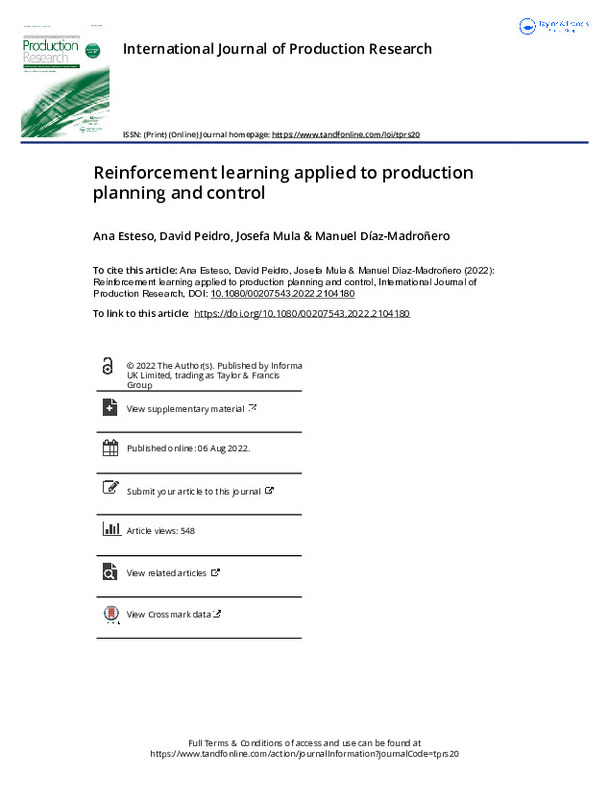JavaScript is disabled for your browser. Some features of this site may not work without it.
Buscar en RiuNet
Listar
Mi cuenta
Estadísticas
Ayuda RiuNet
Admin. UPV
Reinforcement learning applied to production planning and control
Mostrar el registro sencillo del ítem
Ficheros en el ítem
| dc.contributor.author | Esteso, Ana
|
es_ES |
| dc.contributor.author | Peidro Payá, David
|
es_ES |
| dc.contributor.author | Mula, Josefa
|
es_ES |
| dc.contributor.author | Díaz-Madroñero Boluda, Francisco Manuel
|
es_ES |
| dc.date.accessioned | 2023-09-21T18:06:26Z | |
| dc.date.available | 2023-09-21T18:06:26Z | |
| dc.date.issued | 2023-08-18 | es_ES |
| dc.identifier.issn | 0020-7543 | es_ES |
| dc.identifier.uri | http://hdl.handle.net/10251/196934 | |
| dc.description.abstract | [EN] The objective of this paper is to examine the use and applications of reinforcement learning (RL) techniques in the production planning and control (PPC) field addressing the following PPC areas: facility resource planning, capacity planning, purchase and supply management, production scheduling and inventory management. The main RL characteristics, such as method, context, states, actions, reward and highlights, were analysed. The considered number of agents, applications and RL software tools, specifically, programming language, platforms, application programming interfaces and RL frameworks, among others, were identified, and 181 articles were sreviewed. The results showed that RL was applied mainly to production scheduling problems, followed by purchase and supply management. The most revised RL algorithms were model-free and single-agent and were applied to simplified PPC environments. Nevertheless, their results seem to be promising compared to traditional mathematical programming and heuristics/metaheuristics solution methods, and even more so when they incorporate uncertainty or non-linear properties. Finally, RL value-based approaches are the most widely used, specifically Q-learning and its variants and for deep RL, deep Q-networks. In recent years however, the most widely used approach has been the actor-critic method, such as the advantage actor critic, proximal policy optimisation, deep deterministic policy gradient and trust region policy optimisation. | es_ES |
| dc.description.sponsorship | The funding for the research work that has led to the obtained results came from the following grants: CADS4.0 (Ref. RTI2018-101344-B-I00) and NIOTOME (Ref. RTI2018102020-B-I00), financed byMCIN/AEI/10.13039/501100011033 and 'ERDF A way of making DEurope'; the EU H2020 research and innovation programme with grant numbers 825631 'Zero-Defect Manufacturing Platform (ZDMP)' and 958205 'Industrial Data Services for Quality Control in SmartManufacturing (i4Q)'; 'Industrial Production and Logistics Optimization in Industry 4.0' (i4OPT) (Ref. PROMETEO/2021/065) and 'Resilient, Sustainable and PeopleOriented Supply Chain 5.0 Optimization Using Hybrid Intelligence' (RESPECT) (Ref. CIGE/2021/159) Projects were funded by the Generalitat Valenciana (Valencian Regional Government). | es_ES |
| dc.language | Inglés | es_ES |
| dc.publisher | Taylor & Francis | es_ES |
| dc.relation.ispartof | International Journal of Production Research | es_ES |
| dc.rights | Reconocimiento - No comercial - Sin obra derivada (by-nc-nd) | es_ES |
| dc.subject | Artificial intelligence | es_ES |
| dc.subject | Machine learning | es_ES |
| dc.subject | Reinforcement learning | es_ES |
| dc.subject | Deep reinforcement learning | es_ES |
| dc.subject | Production planning and control | es_ES |
| dc.subject | Industry 4.0 | es_ES |
| dc.subject.classification | ORGANIZACION DE EMPRESAS | es_ES |
| dc.title | Reinforcement learning applied to production planning and control | es_ES |
| dc.type | Artículo | es_ES |
| dc.identifier.doi | 10.1080/00207543.2022.2104180 | es_ES |
| dc.relation.projectID | info:eu-repo/grantAgreement/AEI/Plan Estatal de Investigación Científica y Técnica y de Innovación 2017-2020/RTI2018-101344-B-I00/ES/OPTIMIZACION DE TECNOLOGIAS DE PRODUCCION CERO-DEFECTOS HABILITADORAS PARA CADENAS DE SUMINISTRO 4.0/ | es_ES |
| dc.relation.projectID | info:eu-repo/grantAgreement/GENERALITAT VALENCIANA//PROMETEO%2F2021%2F065//Industrial Production and Logistics Optimization in Industry 4.0 (i4OPT) / | es_ES |
| dc.relation.projectID | info:eu-repo/grantAgreement/AEI/Plan Estatal de Investigación Científica y Técnica y de Innovación 2017-2020/RTI2018-102020-B-I00/ES/INTEGRACION DE LA TOMA DE DECISIONES DE LOS NIVELES TACTICO-OPERATIVO PARA LA MEJORA DE LA EFICIENCIA DEL SISTEMA DE PRODUCTIVO EN ENTORNOS INDUSTRIA 4.0/ | es_ES |
| dc.relation.projectID | info:eu-repo/grantAgreement/GENERALITAT VALENCIANA//CIGE%2F2021%2F159//Optimización de cadenas de suministro 5.0 resilientes, sostenibles y orientadas a personas mediante inteligencia híbrida/ | es_ES |
| dc.relation.projectID | info:eu-repo/grantAgreement/EC/H2020/825631/EU | es_ES |
| dc.relation.projectID | info:eu-repo/grantAgreement/EC/H2020/958205/EU | es_ES |
| dc.rights.accessRights | Abierto | es_ES |
| dc.contributor.affiliation | Universitat Politècnica de València. Escuela Técnica Superior de Ingenieros Industriales - Escola Tècnica Superior d'Enginyers Industrials | es_ES |
| dc.contributor.affiliation | Universitat Politècnica de València. Escuela Politécnica Superior de Alcoy - Escola Politècnica Superior d'Alcoi | es_ES |
| dc.description.bibliographicCitation | Esteso, A.; Peidro Payá, D.; Mula, J.; Díaz-Madroñero Boluda, FM. (2023). Reinforcement learning applied to production planning and control. International Journal of Production Research. 61(16):5772-5789. https://doi.org/10.1080/00207543.2022.2104180 | es_ES |
| dc.description.accrualMethod | S | es_ES |
| dc.relation.publisherversion | https://doi.org/10.1080/00207543.2022.2104180 | es_ES |
| dc.description.upvformatpinicio | 5772 | es_ES |
| dc.description.upvformatpfin | 5789 | es_ES |
| dc.type.version | info:eu-repo/semantics/publishedVersion | es_ES |
| dc.description.volume | 61 | es_ES |
| dc.description.issue | 16 | es_ES |
| dc.relation.pasarela | S\472042 | es_ES |
| dc.contributor.funder | GENERALITAT VALENCIANA | es_ES |
| dc.contributor.funder | AGENCIA ESTATAL DE INVESTIGACION | es_ES |
| dc.contributor.funder | European Regional Development Fund | es_ES |
| dc.contributor.funder | COMISION DE LAS COMUNIDADES EUROPEA | es_ES |
| dc.subject.ods | 09.- Desarrollar infraestructuras resilientes, promover la industrialización inclusiva y sostenible, y fomentar la innovación | es_ES |
| upv.costeAPC | 3085,5 | es_ES |








